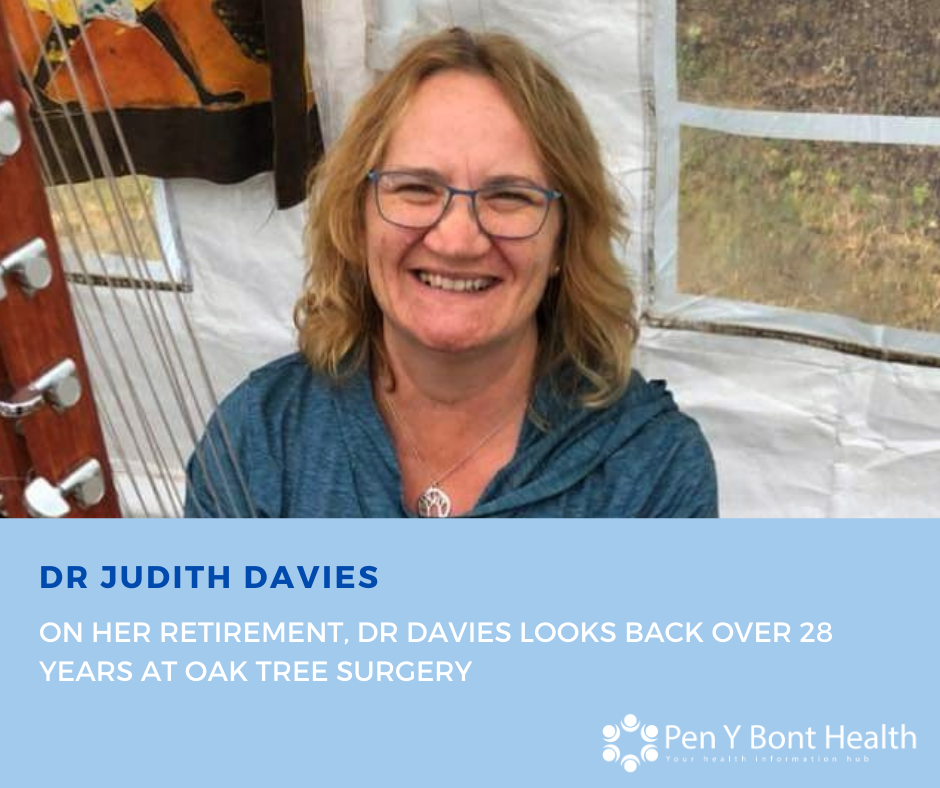 As Dr Judith Davies begins her retirement after 28 years at Oak Tree Surgery we ask her to reflect back on her time as a Doctor within our community.
As Dr Judith Davies begins her retirement after 28 years at Oak Tree Surgery we ask her to reflect back on her time as a Doctor within our community.
Judith how does it feel to be leaving Oak Tree Surgery after 28 years?
I have mixed feelings about my retirement. I would say my main emotions are those of sadness at leaving clinical work which has been my life for 35 years but also that of gratitude for an amazing career as a GP at Oak Tree Surgery. I have felt extremely privileged to look after the patients in the community for over 28 years whilst being able to work within a fantastic Primary Care Team who are always highly professional and dedicated to patient care.
How old were you when you realised that you wanted to be a Doctor?
That is a very good question as I can’t remember a time when I didn’t want to be a doctor! As the first member of my close family to even go to university I was focussed from an early age to achieve the necessary grades at school in North Yorkshire and later at Pearson College in Canada (a United World College).
I initially started studying medicine at the University of Bristol and then transferred to what was then the Welsh National School of Medicine in Cardiff as I was marrying a resident of Wales!
I have since spent all my professional life working in South East Wales and this year saw the 35-year reunion of my graduation – on Zoom of course!!
Has it been a rewarding career?
My medical career has definitely been a rewarding one.
I am dually trained both as a GP and a paediatrician and it has been a pleasure to see babies whom I looked after in the Special Care Baby Unit with a very precarious start to life grow into fantastic young adults and in turn have children themselves and completing the Circle of Life!
Latterly the biggest challenges and rewards had been in trying to help patients cope with the ways that the immense stresses and strains of life were impacting on both their mental and physical well-being.
What have been the biggest changes to the profession since you qualified?
Online access to medical research and information has helped better inform both the medical professionals and patients – which has meant patients have been able to take better ownership towards maintaining good health and managing their illnesses. Unfortunately, there is also a lot of “fake news” around and the adverse impact of social media on individuals is a big challenge.
2020 has seen a massive change to how GPs consult in order to give patients timely help whilst trying to do so in a Covid safe way. Technology has allowed for fast adaptation to distanced consultations – using phone, e-consulting and video links whilst still enabling the necessary face to face consultations.
What impact do you think Covid-19 has had on our community and our patients?
Where to start with this – the impacts are so many and so severe: from the fear of becoming ill with Covid-19, coping with illness personally and in family members and friends, to losing loved ones from Covid-19 or other illnesses, not being able to be present in their dying hours or have the chance to properly say goodbye with a funeral and celebration.
Then there are the effects of lockdowns and restrictions across all age groups and society: the impact of furloughs, redundancy, loss of income and financial and housing insecurity, loneliness and restricted social contact, the closure of schools, home schooling, lack of opportunity for young people to study face to face or secure any form of employment.
All of these are taking a toll on mental well- being – however the flip side is that communities have come together to help and support one another and to look at innovative ways in which they can survive and thrive.
Let us hope that the current restrictions and the roll out of the vaccine will enable us to resume a more meaningful life.
What one piece of health advice do you wish everyone understood the importance of?
That prevention is better than cure!
This goes for all aspects of health – good diet, exercise, mindfulness, adequate sleep, connecting with nature, meaningful social interactions, and relationships – adding up to better physical and mental well- being.
Even small changes can make a difference.
How do you plan on spending your retirement?
Getting more involved with the British Society of Lifestyle Medicine. And most importantly looking at ways I can contribute to reduce the impact of Climate Change – because undoubtedly the climate crisis will potentially affect humanity far more than any pandemic.
What are you most looking forward to next year and in the years to come?
Being able to meet up with family and friends again and give them all a big, big hug!
A hug that lasts 20 seconds has been shown to release the hormone oxytocin which reduces stress and makes us happier – and we certainly all need that going forward!!
Thank you Judith – what a lovely sentiment to finish on!
From everyone at PYB Health & I am sure on behalf of all your patients we would like to say Thank You for all you have done and wish you a very happy and healthy retirement.
